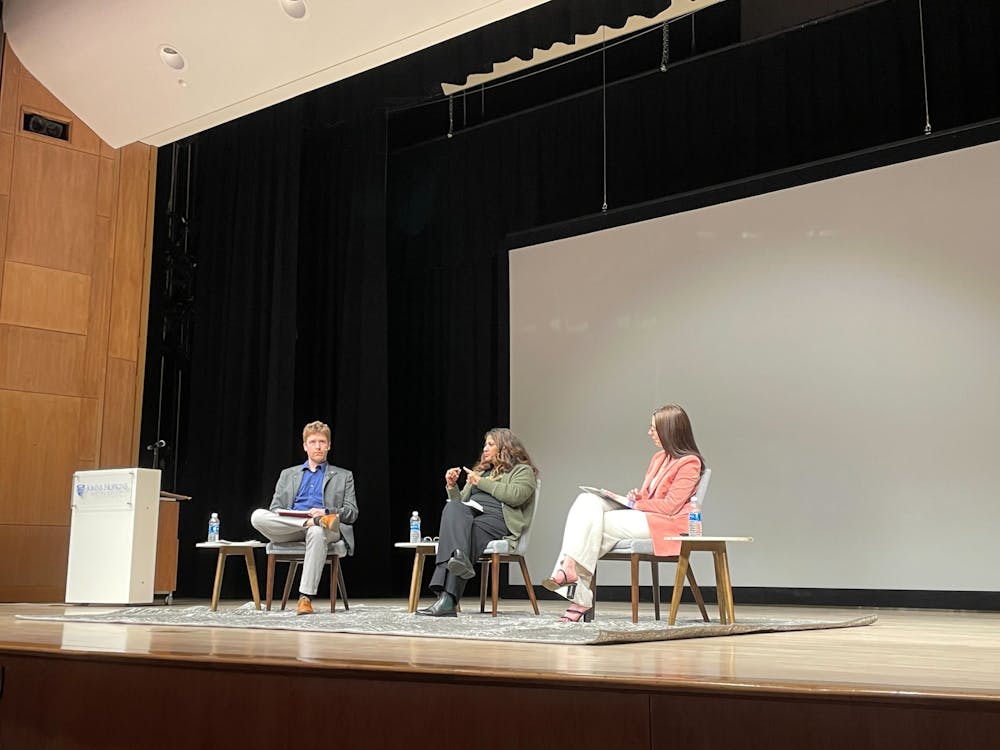The Foreign Affairs Symposium (FAS) and the SNF Agora Institute Debate Initiative cohosted the Debate on Climate Change Response with Amali Tower and Patrick Brown on March 16. This event was the third of six events in this year’s “Paradigm Shift” symposium series.
In an interview with The News-Letter, FAS Co-Executive Director Rachel Fink explained their process in planning this debate.
“We knew from the beginning that we wanted to have a talk on climate change because it’s a pressing issue. We chose climate refugees as the topic because we think it is an immediate and ever-growing issue but is not acknowledged adequately in conversation,” she said. “[Amali and Patrick] matched each other well in their different experiences and expertise.”
Being the first collaboration between FAS and SNF Agora, this was the first symposium event that adopted a debate format. The resolution of the debate was “climate change will cause a substantial increase in forced migration over time.”
Tower, climate activist and founder of Climate Refugees, took the pro position while Brown, climate and energy expert in academia and research, represented the con position. Louise Flavahan, the dialogue and debate director at the SNF Agora Institute, moderated the debate.
In an interview with The News-Letter, sophomore Bryan Figueroa shared his appreciation for this new debate format.
“I’ve been to a few FAS events. I think the debate format was definitely interesting because, for lack of a better word, it added a little more spice to it,” he said.
Sophomore Sam Crankshaw also found this event more well-moderated compared to other FAS events, explaining that Flavahan was professional in directing dialogues and showed a depth of knowledge on the topic. While finding the debate informational, Crankshaw also expressed a desire for the two speakers to step out of their preconceived mindsets more.
“They were both so entrenched in their perspectives, and they made pretty standard arguments, how climate is a social justice issue versus how it is a development economic issue,” he said. “They both could have diversified their arguments a little more.”
In the debate, Tower emphasized the deep asymmetrical system of power embedded in the issue of climate change.
“Climate change is more acutely felt in the global South in the developing world that has not had the privilege of development under industrialization. Those populations are feeling the negative impacts of climate change, something they have not contributed to and are the least prepared to adapt and respond to,” she said. “This is fundamentally a product of injustice.”
Brown argued that the impacts of climate change are in reality not as stated in prevalent discourse. Empirical evidence indicates that changes in climate are slow and subtle, especially compared to technological, socioeconomic and geopolitical impacts on human migration.
Instead, Brown pointed out that there have actually been positive global trends in climate-sensitive aspects of society. He enumerated a wide variety of data, including increasing crop yields and calories available per person, decreasing death rates from malnutrition and famines, increasing population with access to safe drinking water and livable land, decreasing rate of climate-influenced diseases and decreasing deaths from natural disasters. Overall, he argued that resilience to a hostile climate has increased dramatically.
“There is a huge disconnect between the way in which media covers extreme weather and what the data actually shows,” he said. “For example, there are no clear global increases in hurricanes, floods and droughts, which are the main causes of forced climate-related displacement.”
Tower challenged Brown’s optimism, pointing out the various unfilled climate promises made by developed countries.
“In 2019, the climate talks resulted in a pledge where the polluting countries pledged 100 billion dollars per year in climate adaptation funding to do exactly what Patrick just mentioned, to help developing countries adapt to the negative effects of climate change,” she said. “It is 2023. That money has still not been provided.”
She also argued against Brown’s reliance on quantitative data and proposed that the lived human experience could not be measured by these data. She referred to her experience in refugee protection, through which she witnessed the impacts of slow-onset climate events such as drought, which are harder to gauge.
Fink found Tower’s human lens to this scientific question inspiring.
“I really enjoyed the way that [Tower] pushed back on the way that statistics can override or outshine the lived experience of people at the frontlines of climate change,” she said. “The debate offered a good range of perspectives, both the science and the stories of the refugee experience.”
Crankshaw found Brown’s arguments more convincing. While he did not agree with Brown on everything, he thought Brown defended his stance well despite being on the harder side of the debate, as Amali’s side is more popular in both popular discourse and academia.
“I liked his point about how climate change isn’t an excuse to tell developing countries they can’t build gas refineries or coal factories,” he said. “It’s a side of [the] debate you don’t really hear too often, but it’s unfair to expect developing countries not to do what the West has done to develop.”
Following the debate, participants engaged in a post-debate poll in which the moderator reported an evenly spread result between the pro and the con side — a substantial difference from the pre-debate poll where an overwhelming majority of 85% voted for the pro side.
In an interview with The News-Letter, Flavahan expressed that such expansion of perspectives was among the most important goals of the event. By modeling debates and disagreements in public, Flavahan hoped to make discussions and disagreements more accessible for students.
“[We are] less focused on making sure people know the formal style of policy debate or public forum or Oxford Union debate,” she said. “It’s more about how people can understand multiple sides of an issue, better understand the context within which an issue exists and how to engage in those conversations.”





